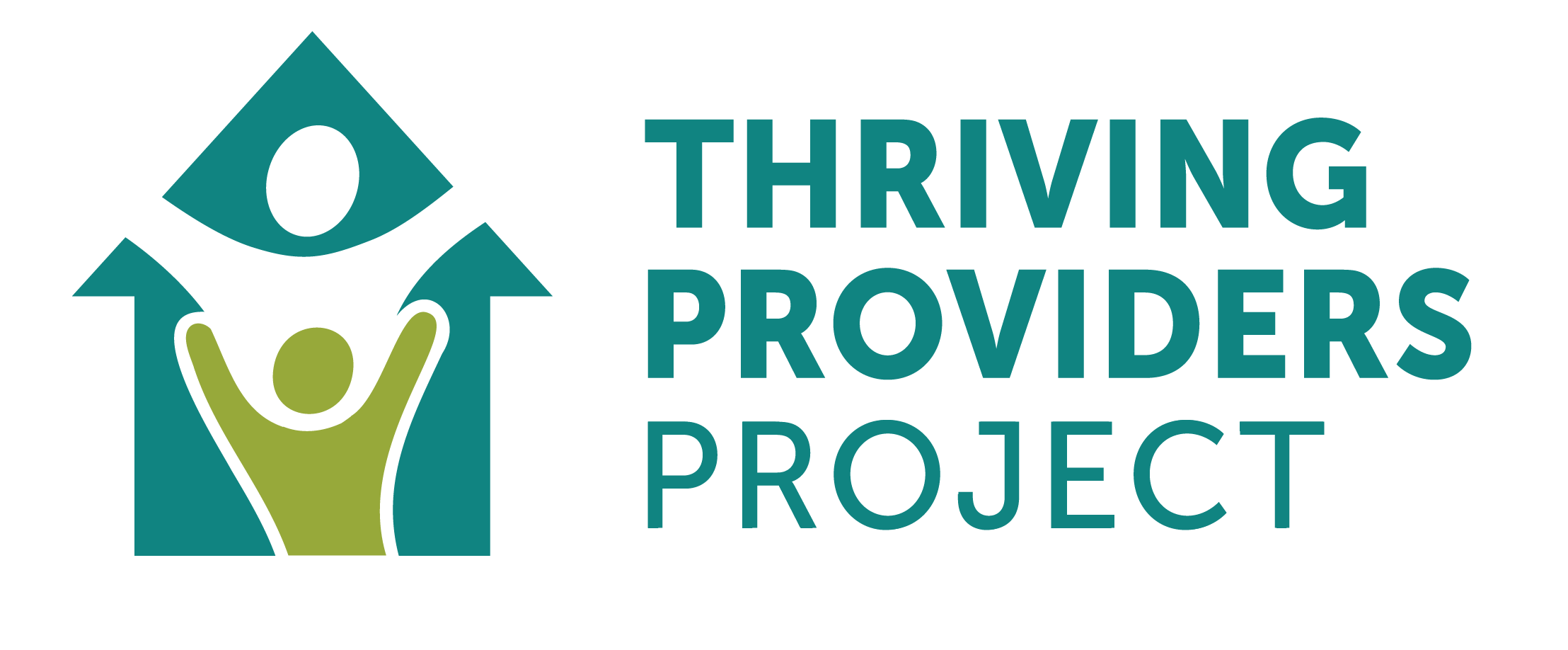By: Lamisa Mustafa, MPP and Callie Silver, PhD, Stanford Center on Early Childhood
Two years ago, Home Grown launched the Thriving Providers Project (TPP) to uplift home-based child care (HBCC) providers and engender policy shifts around stable, increased compensation for this essential, yet underpaid workforce. We are thrilled that the first pilot of this direct cash transfer (DCT) initiative successfully concluded in Colorado. For 18 months between July 2022 and April 2024, 100 providers received monthly payments of $500, as well as access to psychological and peer support services.
Since TPP began, the Stanford Center on Early Childhood (SCEC) has led a mixed-methods evaluation grounded in rapid-cycle continuous improvement and community engagement. Of the 100 TPP participants, 54 opted into the evaluation and completed monthly surveys. The study sample was primarily Family, Friend and Neighbor (FFN) caregivers who identified as female, spoke Spanish and reported a household income below 200% FPL. With TPP implementation in Colorado now complete, we are excited to share the 18-month report, which highlights findings from the SCEC’s evaluation.
Key learnings include:
- FFN caregivers found TPP enrollment easy and accessible, and they reported receiving reliable and timely payments. These findings provide proof of concept for the DCT methodology to inform states’ implementation of the new Child Care and Development Fund (CCDF) rule that requires timely and reliable mechanisms for paying HBCC providers.
- Qualitative data indicated that FFN caregivers experienced more income stability and used the extra money to meet basic needs. These findings suggest the potential for temporary DCTs to reduce providers’ experiences of income volatility and material hardship, as well as the need for systemic changes to improve providers’ economic and overall well-being.
- Many FFN caregivers reported that the DCTs allowed them to purchase resources for the children in their care, be more present in caretaking and engage in more professional development. One focus group participant shared, “[TPP] helped me to want to … keep informing myself and to keep taking courses to give the best of myself.” These findings point to the fact that children may have benefited from providers’ enrollment in TPP because FFN caregivers invested in increasing the quality of their services.
- According to multiple FFN caregivers, the DCTs made them feel more financially stable, less stressed and more valued. One FFN caregiver noted, “[TPP] made a big difference … it kept me calmer, more relaxed, and that is reflected in the care of the children.”
- Some FFN caregivers reported that the support from TPP made them feel more confident that they could continue their jobs, indicating that compensation strategies like DCTs can help stabilize the ECE workforce. One FFN caregiver stated, “When I started receiving the TPP, not only did I stay … but it also helped me to pay for the most essential expenses.”
- FFN caregivers reported greater comfort with CBOs, which is critical in expanding their public benefits access. However, low rates of benefit utilization during TPP indicate that there are other barriers — like immigration status and licensure — that limit FFN caregivers’ take-up of public benefits. TPP is a model for the trust-building that CBOs can do to ensure that FFN caregivers are aware of the benefits available to them and receive support to receive those benefits. TPP also informs ongoing policy advocacy efforts to make accessing public benefits less burdensome for FFN caregivers.
As TPP implementation continues in Philadelphia and New York City and expands to Los Angeles in 2025, we look forward to learning more about providers’ experiences of TPP in these new sites. We will examine how our takeaways may be shaped by the unique needs and local contexts of TPP participants in different communities. This report exemplifies the importance of directly engaging provider consultants to ensure that research reflects participants’ lived experiences. This evaluation of TPP in Colorado speaks to the potential positive impacts that providing unrestricted wage supplements can have on HBCC providers’ financial and psychological well-being, job retention and professional growth, and the quality of their caretaking.
This report is the culmination of deep partnership between HBCC providers, CBOs and other key informants. This blog post is only a snapshot, and we highly encourage anyone interested in this work to read the full report to learn more about our process and FFN caregivers’ testimonies regarding their experiences with TPP.
Principales enseñanzas de la primera implementación completa del TPP: anuncio del informe de 18 meses del TPP en Colorado (Español)
Por: Lamisa Mustafa, MPP y Callie Silver, PhD, Centro Stanford para la Primera
Infancia
Hace dos años, Home Grown lanzó el Proyecto de Proveedores Prósperos (TPP) para
mejorar las condiciones de trabajo de los proveedores de cuidado infantil en el hogar
(HBCC) y generar cambios de política en torno a una compensación estable y mayor
para esta fuerza laboral esencial, pero mal remunerada. Estamos encantados de que la
fase experimental de esta iniciativa de transferencia directa de pagos en efectivo (DCT)
haya concluido con éxito en Colorado. Durante 18 meses, entre julio de 2022 y abril de
2024, 100 proveedores recibieron pagos mensuales de 500 dólares, así como acceso a
servicios de apoyo psicológico y de pares.
Desde que comenzó el TPP, el Centro Stanford para la Primera Infancia (SCEC) ha
liderado una evaluación de métodos mixtos basada en la mejora continua de ciclo
rápido y la participación de la comunidad. De los 100 participantes del TPP, 54 optaron
por participar en la evaluación y completaron encuestas mensuales. La muestra del
estudio estuvo compuesta principalmente por cuidadores de familiares, amigos y
vecinos (FFN, por sus siglas en inglés) que se identificaron como mujeres, hablaban
español y reportaron un ingreso familiar inferior al 200% del FPL. Una vez completada
la implementación del TPP en Colorado, nos complace compartir el reporte de los 18
meses/, que destaca los hallazgos de la evaluación de la SCEC.
Los aprendizajes clave incluyen:
– Los cuidadores de FFN encontraron la inscripción al TPP fácil y accesible, e informaron haber recibido pagos confiables y oportunos. Estos hallazgos proporcionan una prueba de concepto para que la metodología DCT informe la implementación por parte de los estados de la nueva regla del Fondo de Desarrollo y Cuidado Infantil (CCDF) que requiere mecanismos oportunos y confiables para pagar a los proveedores de HBCC.
– La información cualitativa indicó que los cuidadores FFN experimentaron una mayor estabilidad de ingresos y utilizaron el dinero extra para satisfacer sus necesidades básicas. Estos hallazgos sugieren el potencial de las TCD temporales para reducir las experiencias de volatilidad de ingresos y dificultades materiales de los proveedores, así como la necesidad de cambios sistémicos para mejorar el bienestar económico y general de los proveedores.
– Muchos cuidadores de FFN informaron que las DCT les permitieron comprar recursos para los niños bajo su cuidado, estar más presentes en el cuidado y participar en un mayor desarrollo profesional. Un participante del grupo focal compartió: “[TPP] me ayudó a querer… seguir informándome y continuar tomando cursos para dar lo mejor de mí”. Estos hallazgos apuntan al hecho de que los niños pueden haberse beneficiado de la inscripción de los proveedores en el TPP porque los cuidadores FFN invirtieron en aumentar la calidad de sus servicios.
– Según varios cuidadores de FFN, las DCT los hicieron sentir más estables financieramente, menos estresados y más valorados. Un cuidador de FFN señaló: “[TPP] marcó una gran diferencia… me mantuvo más tranquilo, más relajado y eso se refleja en el cuidado de los niños”.
– Algunos cuidadores de FFN informaron que el apoyo del TPP los hizo sentir más seguros de que podrían continuar con sus trabajos, lo que indica que las estrategias de compensación como las DCT pueden ayudar a estabilizar la fuerza laboral de ECE. Un cuidador de FFN afirmó: “Cuando comencé a recibir el TPP, no solo me quedé… sino que también me ayudó a pagar por los gastos más esenciales”.
– Los cuidadores de FFN informaron de una mayor comodidad con las CBO, lo cual es fundamental para ampliar su acceso a los beneficios públicos. Sin embargo, las bajas tasas de utilización de beneficios durante el TPP indican que existen otras barreras (como el estatus migratorio y la licencia) que limitan la
aceptación de los beneficios públicos por parte de los cuidadores FFN. TPP es un modelo para generar confianza que las OBC pueden adoptar para garantizar que los cuidadores FFN estén conscientes de los beneficios disponibles para ellos y reciban apoyo para acceder a esos beneficios. El TPP también informa los esfuerzos continuos de promoción de políticas para hacer que el acceso a los beneficios públicos sea menos gravoso para los cuidadores FFN.
A medida que la implementación del TPP continúa en ciudades como Filadelfia y Nueva York, y se expande a Los Ángeles en 2025, esperamos aprender más sobre las experiencias del TPP de los proveedores en estos nuevos sitios. Examinaremos cómo nuestras conclusiones pueden verse moldeadas por las necesidades únicas y los contextos locales de los participantes del TPP en diferentes comunidades. Este informe ejemplifica la importancia de involucrar directamente a consultores de proveedores para garantizar que la investigación refleje las experiencias vividas por los participantes. Esta evaluación del TPP en Colorado habla de los posibles impactos positivos que puede tener el suministro de complementos salariales sin restricciones en el bienestar financiero y psicológico de los proveedores de HBCC, la retención laboral y el crecimiento profesional, y la calidad de su cuidado.
Este reporte es la culminación de una estrecha colaboración entre proveedores de HBCC, organizaciones comunitarias y otros informantes clave. Esta publicación de blog es solo una instantánea y recomendamos encarecidamente a cualquier persona interesada en este trabajo que lea el informe completo para obtener más información sobre nuestro proceso y los testimonios de los cuidadores de FFN sobre sus experiencias con TPP.

